The rise of online shopping has fundamentally transformed the way businesses operate and market themselves. Whether you’re just starting your eCommerce business or you’re an established brand looking to accelerate growth, choosing the right eCommerce marketing agency is critical to your success. With countless agencies claiming expertise in digital marketing, navigating through the options can be overwhelming.
The challenge isn’t just finding an agency that offers marketing services; it’s finding one that understands eCommerce specifically, knows how to drive qualified traffic that converts, and can scale campaigns effectively as your business grows.
So, how do you choose the right eCommerce marketing agency to not only increase your online visibility but to grow your business efficiently and profitably?
In this guide, we’ll walk through the key factors you should consider when selecting an eCommerce marketing agency that aligns with your business goals and growth objectives. From evaluating their track record to understanding their service offerings, these decisions will directly impact your marketing ROI, customer acquisition costs, and ultimately, your bottom line.
5 Steps to Choose the Right Ecommerce Marketing Agency for Your Business
Choosing the right eCommerce marketing agency is essential for scaling your online store effectively. From evaluating their expertise in your industry to ensuring they understand your target audience, every decision impacts your marketing success and business growth.
Here are the vital steps you need to take to make informed choices and partner with an agency that can deliver measurable results.
Step 1: Evaluate the Agency’s Ecommerce Expertise and Track Record
One of the first and most important decisions you’ll make when selecting a marketing partner is evaluating their specific experience with eCommerce businesses. Not all digital marketing agencies understand the unique challenges and opportunities that online retailers face. The agency you choose should have a proven track record of helping eCommerce businesses achieve measurable growth through strategic marketing campaigns.
When evaluating potential agencies, start by asking yourself a few key questions:
- What specific eCommerce marketing results have they delivered for similar businesses?
- Do they understand the customer journey from awareness to purchase in online retail?
- Can they demonstrate expertise in conversion optimization and customer lifetime value?
Here are some factors to consider when evaluating an eCommerce marketing agency:
Industry Experience and Case Studies: Whether you’re in fashion, electronics, or specialty products, you’ll want an agency that understands your industry dynamics and customer behavior patterns. Look for agencies that can provide detailed case studies showing how they’ve helped similar businesses overcome marketing challenges and achieve growth targets.
eCommerce-Specific Metrics Understanding: Ensure the agency focuses on metrics that matter for online retail success. This includes everything from cost per acquisition (CPA) and return on ad spend (ROAS) to customer lifetime value (CLV) and average order value (AOV). They should understand how these metrics interconnect and impact your overall profitability.
Platform and Technology Knowledge: Protecting your marketing investment requires working with experts who understand your eCommerce platform. Look for agencies experienced with your specific platform, whether it’s Shopify, WooCommerce, Adobe commerce, or BigCommerce, and familiar with the marketing tools and integrations that can maximize your results.
Growth Stage Specialization: As your business evolves, so will your marketing needs. Choose an agency that has experience working with businesses at your current stage, whether you’re a startup looking for initial traction, a growing business scaling operations, or an established brand expanding into new markets.
Performance Accountability: Reliable agencies will provide clear performance guarantees and regular reporting. Whether you’re tracking conversion improvements or revenue growth, transparent communication about results and ongoing optimization strategies will ensure you’re getting value from your investment.
Popular eCommerce marketing agencies like NoGood, Disruptive Advertising, and WebFX offer different specializations, pricing models, and service levels. Take your time to explore each agency’s portfolio and client testimonials to find the one that best fits your current needs and future growth plans.
Step 2: Assess Their Service Offerings and Marketing Channel Expertise
Once you’ve identified agencies with solid eCommerce experience, the next step is to evaluate their specific service offerings and channel expertise. Great eCommerce marketing agencies offer a comprehensive range of services designed to drive traffic, improve conversions, and maximize customer lifetime value across multiple touchpoints.
Here are some core services and capabilities you should look for:
Search Engine Optimization (SEO): eCommerce businesses rely heavily on organic search traffic for sustainable growth. Make sure the agency has demonstrated expertise in eCommerce SEO, including technical SEO for large product catalogs, content marketing strategies that drive organic traffic, and local SEO if you have physical locations or serve specific geographic markets.
Pay-Per-Click Advertising (PPC): Customers expect immediate results from paid advertising campaigns. Providing Google Ads and social media advertising expertise will not only improve your short-term revenue but also help you understand which products and audiences provide the best return on investment.
Social Media Marketing and Influencer Partnerships: Social commerce is becoming increasingly important for eCommerce success. Make sure your agency understands platform-specific strategies for Instagram Shopping, Facebook Ads, TikTok marketing, and influencer marketing, kinds of programs that can expand your brand reach and drive authentic engagement.
Email Marketing and Automation: With more consumers expecting personalized communication throughout their shopping journey, your marketing agency must excel at creating sophisticated email marketing campaigns. Choose an agency that can implement advanced automation sequences, segmentation strategies, and lifecycle marketing programs that nurture prospects and increase customer retention.
When it comes to service packaging, flexibility and customization are key. Look for an agency that offers service packages suited to your business size and marketing maturity. Some agencies may specialize in specific channels like paid advertising, while others provide full-service marketing solutions. You’ll also want to ensure that the agency you choose can adapt its approach as your business grows, so you’re getting the most effective combination of services for your current stage.
Step 3: Evaluate Their Communication Style and Reporting Capabilities
Agency partnership success depends heavily on clear communication and transparent reporting. As an eCommerce business owner, you need to understand how your marketing investments are performing and what optimizations are being made to improve results. Poor communication can lead to misaligned expectations, wasted budget, and missed growth opportunities.
Here are some communication and reporting standards to look for in an eCommerce marketing agency:
Regular Performance Reviews: The agency should provide scheduled check-ins and detailed performance reports that go beyond vanity metrics. Look for agencies that focus on revenue impact, conversion rate improvements, customer acquisition costs, and other metrics that directly tie to your business profitability.
Transparency in Campaign Management: Your marketing partner should be open about their strategies, budget allocation, and optimization decisions. This includes providing access to advertising accounts, sharing detailed campaign insights, and explaining their decision-making process for different marketing initiatives.
Proactive Strategy Recommendations: Many agencies offer reactive reporting, but the best eCommerce marketing partners provide proactive recommendations for improvement. These might include seasonal campaign adjustments, new channel opportunities, conversion rate optimization suggestions, and market trend insights that could impact your marketing strategy.
Dedicated Account Management: To ensure consistent service quality and relationship continuity, look for agencies that assign dedicated account managers or teams to your business. This single point of contact approach helps maintain campaign knowledge, ensures faster response times, and builds stronger working relationships over time.
By selecting an eCommerce marketing agency that prioritizes clear communication and comprehensive reporting, you’ll have better visibility into your marketing performance, enabling more informed decisions about budget allocation and strategy adjustments.
Step 4: Understand Their Pricing Structure and Contract Terms
One of the most critical aspects of choosing an eCommerce marketing agency is understanding their pricing model and contract requirements. Different agencies structure their fees in various ways, and the wrong pricing arrangement can significantly impact your profitability and flexibility as your business grows.
Popular agency pricing models include:
Monthly Retainer Fees: Many agencies charge fixed monthly fees for ongoing marketing services. This model provides predictable costs and typically includes a set number of hours or specific deliverables each month. Retainer agreements work well for businesses that need consistent, ongoing marketing support across multiple channels.
Performance-Based Pricing: Some agencies tie their compensation directly to results, charging based on revenue generated, leads delivered, or other key performance indicators. While this alignment can be attractive, make sure the performance metrics are realistic and that the agency has proper tracking systems in place.
Project-Based Fees: For specific marketing initiatives like website redesigns, campaign launches, or seasonal promotions, project-based pricing can be more cost-effective. This model works well for businesses with defined marketing needs and clear project timelines.
Percentage of Ad Spend: Agencies managing your paid advertising often charge a percentage of your advertising budget, typically ranging from 10-25%. This model scales with your advertising investment but can become expensive as your campaigns grow.
Hybrid Pricing Models: Many successful agency partnerships combine multiple pricing approaches, such as a base retainer plus performance bonuses or a management fee plus project-based work for special initiatives.
Ensuring that your agency’s pricing structure aligns with your business model and growth stage will not only help you budget effectively but also create proper incentives for the agency to deliver results that matter to your bottom line. Make sure that the contract terms allow for flexibility as your business evolves and that there are clear performance expectations and exit clauses if the partnership isn’t meeting your needs.
Step 5: Leverage Their Technology Stack and Automation Capabilities
Running successful eCommerce marketing campaigns requires sophisticated technology and automation tools. Between managing multiple advertising platforms, tracking customer behavior, personalizing marketing messages, and optimizing conversion funnels, the right marketing technology can make a significant difference in campaign performance and efficiency.
Modern eCommerce marketing involves numerous moving parts that require seamless integration and automation. Here are some key technology capabilities your agency should bring to the partnership:
Marketing Analytics and Attribution: Advanced tracking systems help you understand the complete customer journey and accurately attribute conversions to different marketing channels. This helps you avoid oversimplifying attribution models and keeps you informed about which marketing investments are driving the highest ROI across your entire marketing funnel.
Customer Data Platform (CDP) Management: Automated customer data collection and segmentation systems can streamline your marketing personalization efforts and ensure consistent messaging across all customer touchpoints. This technology enables more sophisticated targeting and helps create seamless customer experiences from initial awareness through post-purchase retention.
Marketing Automation Workflows: Advanced automation platforms can help you nurture leads more effectively, whether it’s through sophisticated email sequences, retargeting campaigns, dynamic product recommendations, or personalized website experiences based on customer behavior and preferences.
Conversion Rate Optimization Tools: A/B testing platforms, heat mapping software, and user behavior analytics can assist in continuously improving your website performance, reducing cart abandonment rates, and increasing average order values through data-driven optimization strategies.
By partnering with an agency that brings advanced marketing technology and automation expertise, you can achieve better results while reducing manual work and human error. This technological advantage allows you to focus on strategic business decisions while ensuring a consistent, optimized experience for your customers across all marketing touchpoints.
Evaluating Ecommerce Agency Culture and Long-Term Partnership Potential
Beyond technical capabilities and service offerings, the best eCommerce marketing agency partnerships are built on cultural alignment and a shared vision for long-term growth. The agency you choose will become an extension of your team, so compatibility in working styles, communication preferences, and business values is crucial for success.
Team Composition and Expertise Depth: Understanding the agency’s team structure helps you evaluate whether they have the right specialists for your needs. Look for agencies with dedicated eCommerce strategists, conversion optimization experts, creative teams familiar with eCommerce design principles, and account managers who understand retail business models. The depth of their team determines their ability to handle complex challenges and provide comprehensive solutions.
Innovation and Industry Knowledge: The best eCommerce marketing agencies stay ahead of industry trends and platform updates. They should demonstrate knowledge of emerging marketing channels, new advertising features, changing consumer behaviors, and evolving eCommerce technologies. This forward-thinking approach ensures your marketing strategy remains competitive and takes advantage of new opportunities as they arise.
Scalability and Resource Allocation: As your business grows, your marketing needs will become more complex and demanding. Choose an agency that can scale their services and dedicate appropriate resources to your account. This includes their ability to increase campaign budgets effectively, expand into new marketing channels, support international expansion, and handle increased complexity in your marketing operations.
Making the Final Decision: Finding the Right Ecommerce Marketing Agency
Selecting the right eCommerce marketing agency requires careful evaluation of multiple factors, but the decision-making process shouldn’t end with signing a contract. Setting up the partnership for long-term success requires clear expectations, proper onboarding, and ongoing relationship management.
Trial Period and Performance Benchmarks: Many successful agency partnerships begin with trial periods or pilot projects that allow both parties to evaluate fit and performance. Consider starting with a specific campaign or channel before committing to a comprehensive marketing partnership. Establish clear success metrics and review periods to ensure the relationship is delivering expected results.
Integration with Internal Teams: Your marketing agency should complement your internal capabilities, not replace them entirely. Plan how the agency will work with your existing team members, what internal resources they’ll need access to, and how communication and decision-making will flow between your team and theirs.
Ongoing Partnership Optimization: The best agency relationships evolve and improve over time. Schedule regular strategy reviews, provide feedback on what’s working and what isn’t, and be open to adjusting the partnership structure as your business needs change. This collaborative approach leads to better results and stronger long-term partnerships.
Conclusion
Choosing the right eCommerce marketing agency is one of the most important decisions you can make for scaling your online business. The agency you partner with will directly impact your customer acquisition costs, marketing ROI, and ability to compete effectively in the digital marketplace.
By carefully evaluating agency expertise, service offerings, communication capabilities, pricing models, and technology resources, you’ll be better equipped to select a partner that aligns with your business goals and growth objectives. The right agency brings not just marketing execution capabilities, but strategic insights, industry knowledge, and technological advantages that can accelerate your business growth.
Remember that successful agency partnerships are collaborative relationships built on trust, transparency, and shared commitment to results. Take the time to find an agency that understands your industry, shares your vision for growth, and has the capabilities to execute marketing strategies that drive measurable business impact.
Don’t rush the selection process or choose based solely on price. The right eCommerce marketing agency will more than pay for themselves through improved marketing performance, operational efficiency, and accelerated business growth.
Ready to take your online business to the next level? Start evaluating potential agency partners today using these criteria, and build a marketing partnership that can scale with your business for years to come.

The Chief Author and Editor at Intothecommerce. As a seasoned expert in digital marketing, I direct the site’s strategic content and ensure every piece meets the highest industry standards. My insights drive our coverage on SEO, paid media, and cutting-edge marketing technology.
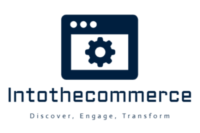
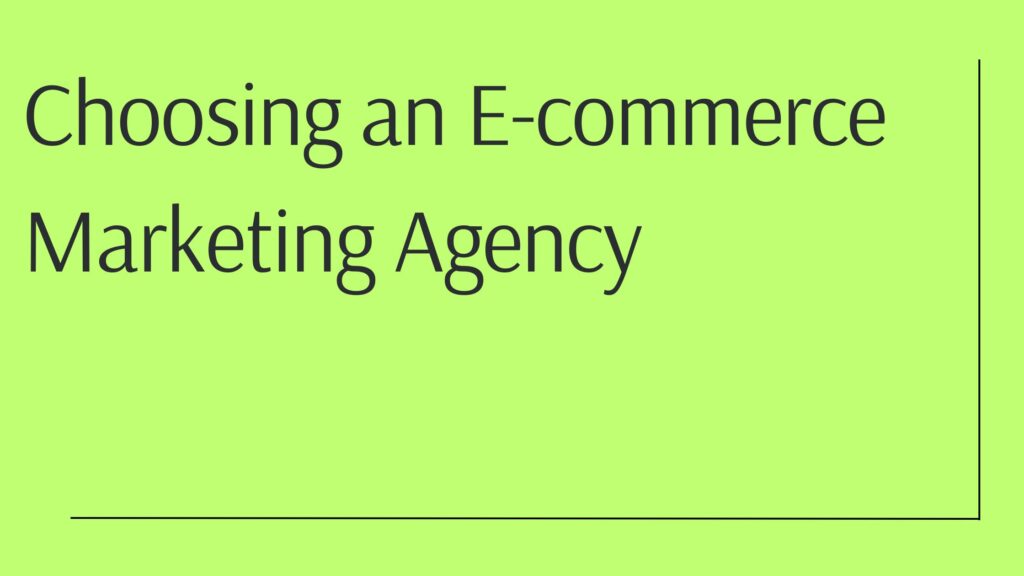
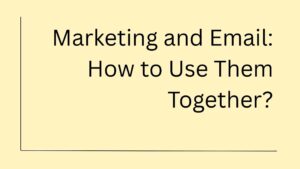
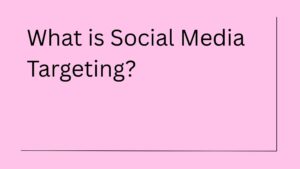
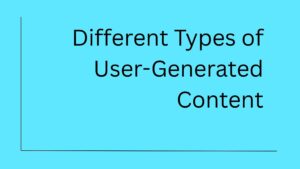
1 thought on “How to Choose an Ecommerce Marketing Agency for Your Business?”
Can you be more specific about the ecommerce and marketing concepts? After reading it, I still have some doubts. Hope you can help me.